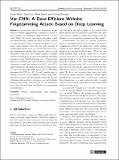Var-CNN: A Data-Efficient Website Fingerprinting Attack Based on Deep Learning
Author(s)
Bhat, Sanjit; Lu, David; Kwon, Albert Hyukjae; Devadas, Srinivas
DownloadPublished version (1021.Kb)
Publisher with Creative Commons License
Publisher with Creative Commons License
Creative Commons Attribution
Terms of use
Metadata
Show full item recordAbstract
In recent years, there have been several works that use website fingerprinting techniques to enable a local adversary to determine which website a Tor user visits. While the current state-of-the-art attack, which uses deep learning, outperforms prior art with medium to large amounts of data, it attains marginal to no accuracy improvements when both use small amounts of training data. In this work, we propose Var-CNN, a website fingerprinting attack that leverages deep learning techniques along with novel insights specific to packet sequence classification. In open-world settings with large amounts of data, Var-CNN attains over 1% higher true positive rate (TPR) than state-of-the-art attacks while achieving 4× lower false positive rate (FPR). Var-CNN’s improvements are especially notable in low-data scenarios, where it reduces the FPR of prior art by 3.12% while increasing the TPR by 13%. Overall, insights used to develop Var-CNN can be applied to future deep learning based attacks, and substantially reduce the amount of training data needed to perform a successful website fingerprinting attack. This shortens the time needed for data collection and lowers the likelihood of having data staleness issues.
Date issued
2019-07Department
Massachusetts Institute of Technology. Department of Electrical Engineering and Computer ScienceJournal
Proceedings on Privacy Enhancing Technologies
Publisher
Walter de Gruyter GmbH
Citation
Bhat, Sanjit et al. “Var-CNN: A Data-Efficient Website Fingerprinting Attack Based on Deep Learning.” Proceedings on Privacy Enhancing Technologies, 2019, 4 (July 2019): 292–310 © 2019 The Author(s)
Version: Final published version
ISSN
2299-0984